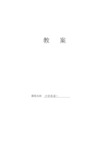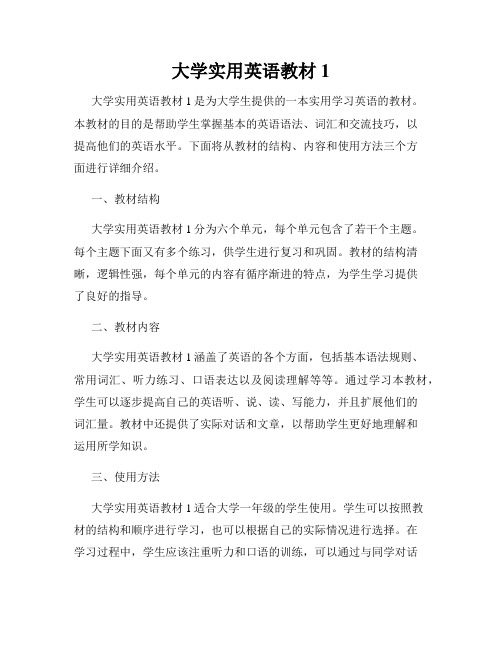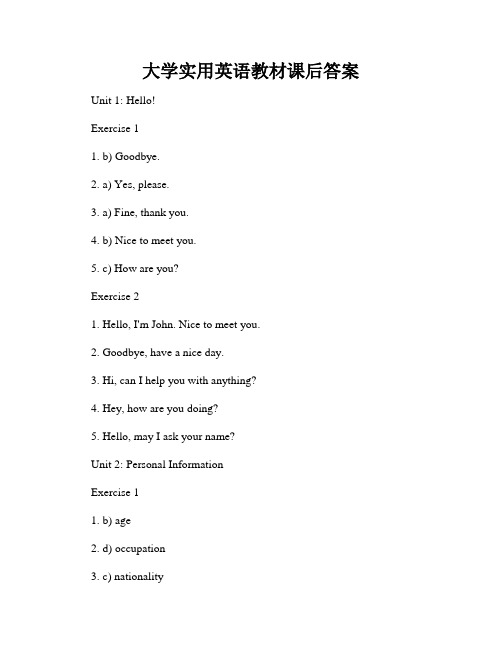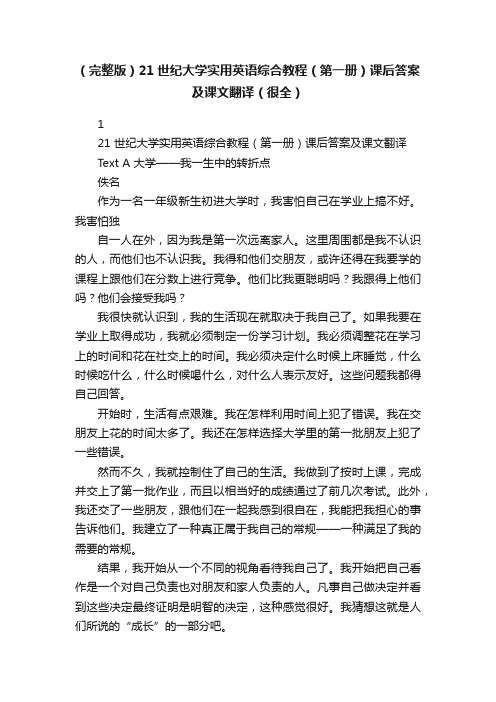大学实用英语1
新编大学实用英语1教案

教学目标:1. 让学生掌握基本的英语发音和语调;2. 培养学生的听、说、读、写四项基本技能;3. 提高学生的英语实际应用能力;4. 培养学生的自主学习能力和团队合作精神。
教学对象:大学一年级新生教学课时:2课时教学准备:1. 教材:《新编大学实用英语1》;2. 多媒体课件;3. 英语发音录音;4. 听力材料;5. 课堂活动材料。
教学过程:第一课时一、导入1. 播放英语歌曲,活跃课堂气氛;2. 介绍课程目标和教学安排。
二、热身活动1. 让学生进行自我介绍,用英语表达;2. 进行简单的英语问候和交流。
三、英语发音和语调1. 讲解英语元音和辅音的发音规则;2. 播放英语发音录音,让学生跟读;3. 进行小组练习,纠正发音错误。
四、听力训练1. 播放英语听力材料,让学生回答问题;2. 讲解听力技巧,提高学生的听力理解能力。
五、阅读训练1. 分发教材中的课文,让学生阅读;2. 提出问题,检查学生的阅读理解能力;3. 进行小组讨论,分享阅读心得。
六、总结与作业1. 总结本节课的学习内容;2. 布置课后作业,包括听力、阅读和写作练习。
第二课时一、复习与巩固1. 回顾上节课的学习内容;2. 进行听力、阅读和写作练习。
二、口语训练1. 让学生用英语进行简单的对话练习;2. 进行小组讨论,提高口语表达能力。
三、写作训练1. 讲解英语写作的基本技巧;2. 让学生根据教材中的范文进行写作练习;3. 进行小组互评,提高写作水平。
四、课堂活动1. 组织学生进行角色扮演,提高英语实际应用能力;2. 进行小组竞赛,激发学生的学习兴趣。
五、总结与作业1. 总结本节课的学习内容;2. 布置课后作业,包括听力、阅读和写作练习。
教学反思:1. 关注学生的学习进度,及时调整教学策略;2. 鼓励学生积极参与课堂活动,提高他们的英语实际应用能力;3. 注重培养学生的自主学习能力和团队合作精神,为他们的英语学习奠定坚实基础。
《新编大学实用英语英语教程》(林立总主编)第一册教案

教案课程名称大学英语1教案书写规范与要求一、以每次课为一个备课单元书写。
二、每一备课单元书写下列内容:1.周次、课次、授课时间、章节名称;2.简要说明:教学目的、重点、难点、教学方法和授课手段(包括与课程相关的上机和实验、课件制作等);3.教学主要内容(教案主体)及教学方法手段;4.作业内容。
注:其余授课电子版文件待本课程结束后,交教务处统一刻成光盘存档。
大学英语1 课程授课总体计划书厦门软件职业技术学院教案厦门软件职业技术学院教案厦门软件职业技术学院教案厦门软件职业技术学院教案5 We are surprised at his great __improvement__(improve) in English.Activity 5 Fill in the blanks with the proper form of the words and phrases given in the box.1We got tired of his _endless_ boring speech.2 _Chatting_with friends is a good way of relaxation.3 Our country is rich in natural_resources__.4 Upon arrival,the singer are surrounded by a lot of fans and reporters.5 Tom _spends a lot of time in playing computer games every day.6To my surprise,only a third of the students in my class are interested in skiing.7He seems so quiet,but _actually he likes talking.8These days all the college students are very busy,especially the seniors.9 I sent her a bunch of flowers as a (an) expression of gratitude.10 Our college offers an excellent art program .Step II Grammar代词(Pronouns)一代词的分类二代词的用法1 人称代词注意:(1)人称代词在比较分句中作主语,用主格;作宾语,用宾格,如:She works harder than I (do).她比我用功。
大学实用英语教材1

大学实用英语教材1
大学实用英语教材1是为大学生提供的一本实用学习英语的教材。
本教材的目的是帮助学生掌握基本的英语语法、词汇和交流技巧,以
提高他们的英语水平。
下面将从教材的结构、内容和使用方法三个方
面进行详细介绍。
一、教材结构
大学实用英语教材1分为六个单元,每个单元包含了若干个主题。
每个主题下面又有多个练习,供学生进行复习和巩固。
教材的结构清晰,逻辑性强,每个单元的内容有循序渐进的特点,为学生学习提供
了良好的指导。
二、教材内容
大学实用英语教材1涵盖了英语的各个方面,包括基本语法规则、
常用词汇、听力练习、口语表达以及阅读理解等等。
通过学习本教材,学生可以逐步提高自己的英语听、说、读、写能力,并且扩展他们的
词汇量。
教材中还提供了实际对话和文章,以帮助学生更好地理解和
运用所学知识。
三、使用方法
大学实用英语教材1适合大学一年级的学生使用。
学生可以按照教
材的结构和顺序进行学习,也可以根据自己的实际情况进行选择。
在
学习过程中,学生应该注重听力和口语的训练,可以通过与同学对话
或者模仿听力材料进行练习。
此外,学生还可以积极参与课堂讨论和课后练习,以巩固所学知识。
总之,大学实用英语教材1是一本优秀的教材,通过系统学习和实践运用,学生可以有效地提高自己的英语水平。
希望广大学生能够充分利用这本教材,不断提升自己的英语能力,为将来的学习和工作做好准备。
二十一世纪大学实用英语(第一册)课后习题翻译

Unit 11.约翰既聪明又有责任心。
他喜欢分别人交朋友。
John is both smart and responsible. He likes to make friends with other people.2.我已经决定竞争这个新岗位。
你也可以竞争。
你自己决定吧。
I have made the decision to compete for the new post. You can compete for it, too. It‟s up to you.3.医生来后不久就设法把我父亲的病控制住了。
Shortly after the doctor came, he managed to have my father‟s illness under control.4.作为新生,我们大部分人都不知道等待着我们的大学生活会是怎样的,但是我们都知道我们必须把学习搞好。
As freshmen, most of us do not know what college life has in store for us, but we all know that we must do well in our studies.5.要在大学里取得成功,我们必须跟上其他的学生并且制定一个适合我们需要的常规。
To succeed in college, we must keep up with the other students and set up a routine that meets our needs.6.虽然上星期的作业比我想象的难,我还是按时交上去了。
Though the assignments last week turned out to be more difficult than I thought, I handed them in on time.Unit 21.你可以把信息转变成(transfer…into) 由点、划组成的密码来使它保密。
大学实用英语教材课后答案

大学实用英语教材课后答案Unit 1: Hello!Exercise 11. b) Goodbye.2. a) Yes, please.3. a) Fine, thank you.4. b) Nice to meet you.5. c) How are you?Exercise 21. Hello, I'm John. Nice to meet you.2. Goodbye, have a nice day.3. Hi, can I help you with anything?4. Hey, how are you doing?5. Hello, may I ask your name?Unit 2: Personal InformationExercise 11. b) age2. d) occupation3. c) nationality4. a) address5. e) emailExercise 21. My name is Sarah.2. I'm from South Korea.3. I'm 23 years old.4. I'm a student at the University of London.5. My telephone number is 123-4567.Unit 3: Daily LifeExercise 11. a) get up2. c) go to work3. b) have lunch4. d) watch TV5. e) go to bedExercise 21. I wake up at 7 am every day.2. I have breakfast at 8 am.3. I go to work at 9 am.4. I have lunch at 12 pm.5. I finish work at 6 pm.Unit 4: Leisure ActivitiesExercise 11. b) playing soccer2. d) listening to music3. c) reading books4. a) watching movies5. e) swimmingExercise 21. I enjoy playing soccer in my free time.2. I love listening to music, especially rock music.3. Reading books helps me relax and unwind.4. I am a movie buff and enjoy watching movies.5. Swimming is a great way to stay fit and have fun. Unit 5: TravelExercise 11. b) hotel2. d) ticket3. a) passport4. e) suitcase5. c) mapExercise 21. I need to book a hotel room.2. I want to buy a plane ticket to Paris.3. I can't find my passport. Can you help me?4. I need to pack my suitcase for the trip.5. Can you show me the way on the map? Unit 6: ShoppingExercise 11. c) price2. d) fitting room3. a) cashier4. b) customer5. e) saleExercise 21. How much is this shirt?2. Where is the fitting room?3. Can I pay at the cashier?4. Are you looking for anything specific, ma'am?5. Is there a sale going on?以上为《大学实用英语教材》第一至六单元的部分课后答案。
21世纪大学实用英语(第2版)教案(第一册)

课程名称: 21世纪大学实用英语综合教程1授课班级:13级非英语专业专科班课程类型: 理论课□实践课总学时:64学分:4使用教材:(主编、书名、出版社、出版时间)翟象俊主编《21世纪大学实用英语综合教程》(1) 复旦大学出版社全新版教学方法、手段:讲授、讨论、练习考核方式:考试Date: Sep. 25, 2013Period: 2Content:Unit 1 listening and speakingTeaching aims:After studying this unit, the students are expected to be able to1.Grasp the basic skills necessary to understand and talk to other people when meeting them for the first time;2.Understand the main ideas of Text A, B and C, and Master the useful sentence structures and words and expressions found in the relevant exercises of the first two texts;3.Know clearly how to use the present simple and past simple tenses of English;4.Fill in a form with their personal information;5.Understand the main idea of an English paragraph and identify the topic sentence. Teaching focus: 1. To learn how to start a conversation with other people2. How to talk about yourself.3. Explain some language points to Ss.4. Explain some grammar points to Ss.Teaching difficulties: 1. How to improve Ss‘ speaking ability.2. How to improve Ss‘ listening ability.Teaching procedures:First PeriodStep 1 Preview (5 minutes)The teacher explains the Preview so that the students will have some idea of what this unit is about.This is the first unit of Book One. In the Listening and Speaking section, you will learn how to start a conversation with other people and how to talk about yourself. Then, the teacher will give the students a chance to introduce you.Step 2 listening and speaking (40 minutes)1) Introducing Yourself (20 minutes)A. listen to the first half of the short talk in Exercise 1 twice and fill in the missing words;B. listen to the second half of the short talk in Exercise 1 twice and fill in the missing words;C. listen to the whole short talk and do Exercise 2.2) Getting to Know People (20 minutes)A.go through the new words in the 1st conversation in Exercise 3 and listen to the conversation twice while filling in the missing words;B.answer the questions about the conversation by way of group discussion or the traditional teacher- student interaction;C.go through the second conversation with the same steps;D.do Exercise 4 in pairs or groups.Second Period3) Listening PracticeA.Listen to people speaking and decide what they are talking about.Each one will be given twice. (5 minutes)B Listen to the following questions and choose the appropriate answers.Each one will be given twice. (5 minutes)C.Listen to the following short dialogues and choose the appropriate answers.Each one will be given twice.(10 minutes)D.Listen to the following talk and fill in the blanks with the missing words.The talk is given twice. (15 minutes)E Listen to the talk again and then answer the following questions orally. (5 minutes)Answers to the listening practice5. C B A B D6. D A B C D7. B C D B A8. find out dreams experiences take care of library different becoming make a livingStep 3 summary (5 minutes)1.How to start a conversation and how to talk about yourself:A. Hello! My name is….B. Hi! I am…2. Some useful expressions:A. by the wayB. come onC. Which department are you in?D. What is your major?E. Where do you come from?F. My major is….G. I am glad to meet you.H. It is a pleasure to meet you.I. How do you do?Step 4 Homework assignment1.Form a dialogue with your classmates.2.preview the new lesson.课后教学效果自评:Date: Sep. 27, 2013Period: 2Content:Unit 1 Text A and text-related exercisesTeaching aims: 1.Understand the main ideas of Texts A,2. Master the useful sentence structures and words and expressions Teaching focus: 1. Explain some language points to the Ss.2. Explain some grammar points to the Ss.Teaching difficulties: 1. How to enlarge Ss‘ vocabulary.2. How to improve Ss‘ reading ability.Teaching procedures:First PeriodStep1. Starter (5 minutes)For many people, college life is a new experience. They feel excited and at the same time a bit worried. How did you feel when you first got to college? Name three things that you felt excited about and three things you felt a bit worried about.Things I felt excited about when I first got to college:1.The first time to go to college.2.meet a lot of people I don't know.3.have new classmates and friends.Things I felt a bit worried about when I first got to college:1.I was afraid of that I was not able to do well in my studies.2.The first time to leave the home.3.I don't know if I can keep up with my classmates?Step 2 Text A College—A transition point in my life (5 minutes)1.Background informationUniversities and colleges are schools that continue a person's education beyond high school. A university or college education helps men and women enjoy richer, more meaningful lives. It prepares many people for professional careers as doctors, engineers, lawyers, or teachers. It also gives a person a better appreciation of such fields as art, literature, history, human relations, and science. In doing so, a university or college education enables individuals to participate with greater understanding in community affairs.Universities differ from colleges in that they are larger, have wider curricula, are involved in research activities, and grant graduate and professional as well as undergraduate degrees.2. Supplementary names of colleges and departmentsBeijing Union University 北京联合大学Shanghai College of Electricity and Machinery Technology 上海电机技术高等专科学校Tianjin V ocational College 天津职业大学Shanxi Finance & Taxation College 山西财政税务专科学校Liaoning Radio & TV University 辽宁广播电视大学Nanchang Water Resources College 南昌水利水电高等专科学校Shanghai Jiaotong University 上海交通大学Northwest Sci-Tech University of Agriculture and Forestry 西北农林科技大学Chengdu Academy of Fine Arts 成都美术学院3.Listen to the whole text and answer some questions about the text. (15 minutes)4.deal with some languages points (30 minutes)1) enter: vt.go or come into (a place) 进入e.g. enter a room/ a houseAs soon as he entered the room, he saw his father and mother.The train has entered the railway station.2)do well: be successful, especially in work or business 干得好e.g. Jack is doing very well at work.Tom did well at school when he was young.3) being off: 离开As this expression is used after the preposition "of", the verb "be" takes the -ing form. The expression "be off " means "leave or be away".e.g. I must be off now (=I must leave).Her son was off on a business trip somewhere (=Her son was away on a business trip somewhere).4.)by oneself: alone 单独,独自e.g. Come in; we're all by ourselves.You can't go home by yourself in the dark.5.)keep up with: move or progress at the same rate as 跟上e.g. had to walk fast to keep up with him.Jack's having trouble keeping up with the other students in his class.6)be up to: be left to (sb.) to decide取决于(某人)的,须由(某人)决定的e.g. You may do your homework today or tomorrow — it's up to you.It's up to our group leader to make the final decision.7.)I had to decide when to go to bed, when… :本课文使用了较多起连接作用的副词和代词。
(完整版)21世纪大学实用英语综合教程(第一册)课后答案及课文翻译(很全)

(完整版)21世纪大学实用英语综合教程(第一册)课后答案及课文翻译(很全)121 世纪大学实用英语综合教程(第一册)课后答案及课文翻译Text A 大学——我一生中的转折点佚名作为一名一年级新生初进大学时,我害怕自己在学业上搞不好。
我害怕独自一人在外,因为我是第一次远离家人。
这里周围都是我不认识的人,而他们也不认识我。
我得和他们交朋友,或许还得在我要学的课程上跟他们在分数上进行竞争。
他们比我更聪明吗?我跟得上他们吗?他们会接受我吗?我很快就认识到,我的生活现在就取决于我自己了。
如果我要在学业上取得成功,我就必须制定一份学习计划。
我必须调整花在学习上的时间和花在社交上的时间。
我必须决定什么时候上床睡觉,什么时候吃什么,什么时候喝什么,对什么人表示友好。
这些问题我都得自己回答。
开始时,生活有点艰难。
我在怎样利用时间上犯了错误。
我在交朋友上花的时间太多了。
我还在怎样选择大学里的第一批朋友上犯了一些错误。
然而不久,我就控制住了自己的生活。
我做到了按时上课,完成并交上了第一批作业,而且以相当好的成绩通过了前几次考试。
此外,我还交了一些朋友,跟他们在一起我感到很自在,我能把我担心的事告诉他们。
我建立了一种真正属于我自己的常规——一种满足了我的需要的常规。
结果,我开始从一个不同的视角看待我自己了。
我开始把自己看作是一个对自己负责也对朋友和家人负责的人。
凡事自己做决定并看到这些决定最终证明是明智的决定,这种感觉很好。
我猜想这就是人们所说的“成长”的一部分吧。
我未来的生活将会怎样呢?在人生的这一阶段,我真的不能确定我的人生之路最终将会走向何方,我真的不知道在以后的几年中我会做什么。
但我知道,我能应对未来,因为我已经成功地跃过了我生命中的这一重要障碍:我已经完成了从一个依赖家人给予感情支持的人向一个对自己负责的人的过渡。
第二单元他帮助了盲人珍妮?K?格里泽眼睛瞎了而又想读书——这就是路易?布莱叶的生活现实。
想顺利进行阅读的愿望导致了布莱叶盲字体系的产生。
大学实用英语(一)Unit1collegelife

surroundings [sə'raʊndɪŋz]
词源:surround(动词)围绕,环绕 surroundings(名词)环境;周围的事物
• to adapt myself to the new surroundings 使自己适应新环境
mature [mə'tʃʊə]
释义1:(形容词adj.)成熟的 • a mature man 一个成熟的男士 释义2:(及物动词vt. )使成熟 • This experience matured her greatly.
• apply to(sth or sb):适用于;应用于 These regulations apply to everyone, without exception.这些规章对谁都适用,没 有例外。
Байду номын сангаас
accumulate [ə‘kjuːmjʊleɪt]
释义:(及物动词)积累
• to accumulate the wealth 积攒财富 • to accumulate money 攒钱(相当
于save money)
▲experience [ɪk'spɪərɪəns]
释义1:(名词)经验;经历 • accumulate the experience
积累经验 • Experience is the mother of wisdom.
经验为智慧之母。 释义2:(及物动词)经历,体验 • experience pleasure/pain
Unit 1 College Life
Structure
• Section A Listening and Speaking • Section B Reading • Section C Tringing Your Hand
